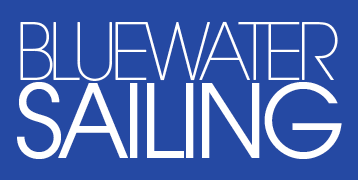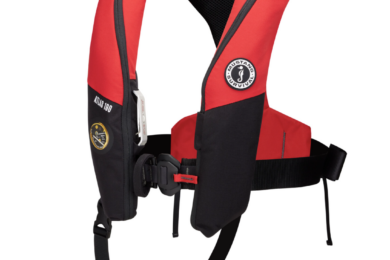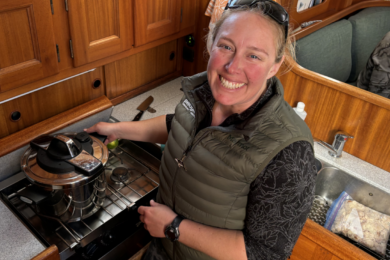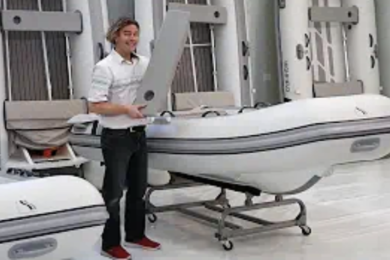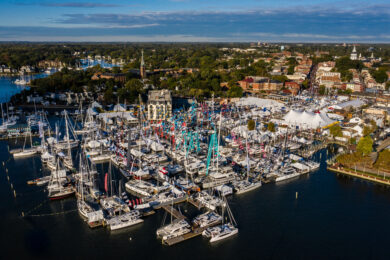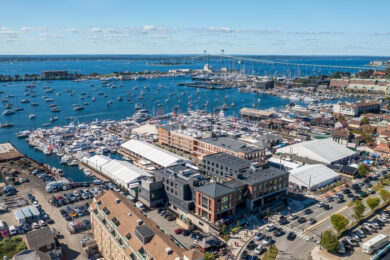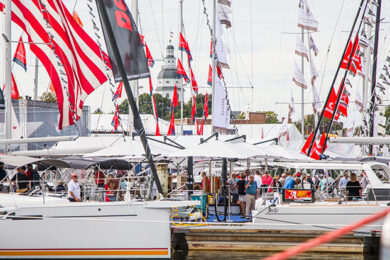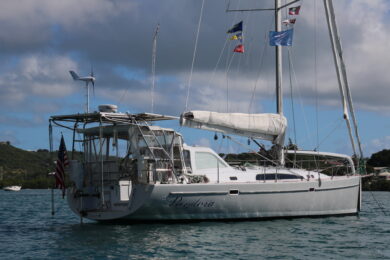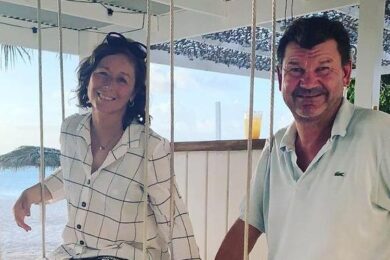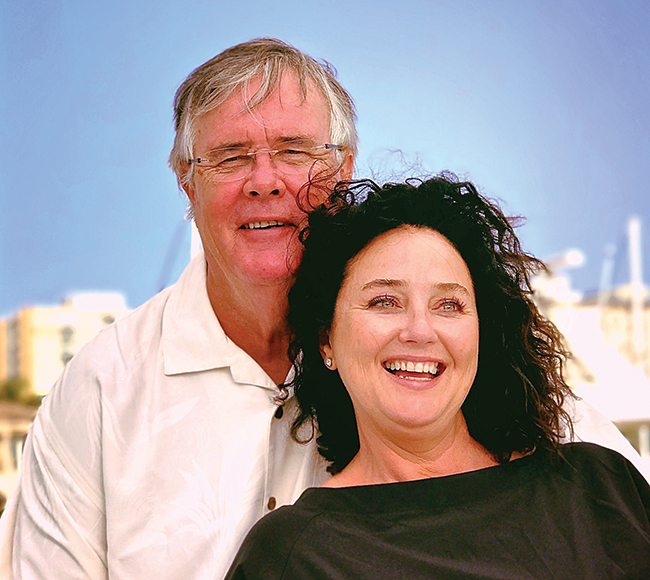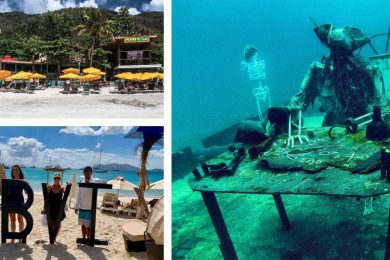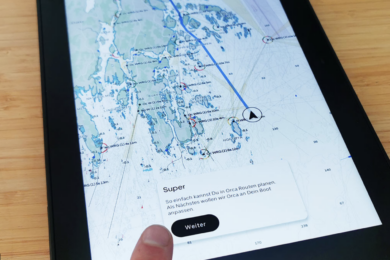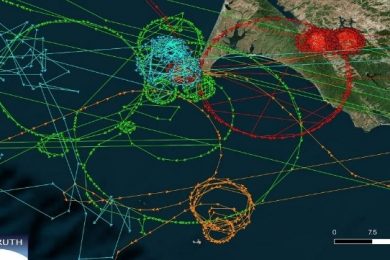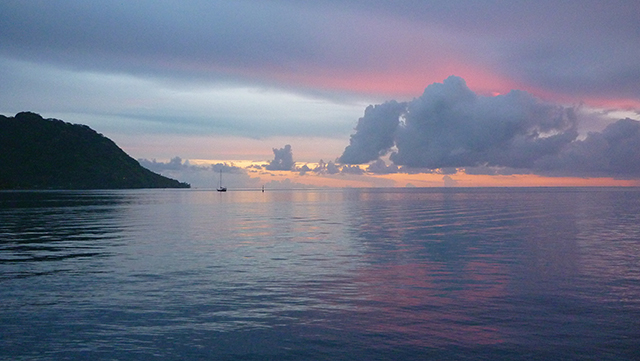Handling the unsettling warnings of a potentially destructive force (published November 2013)
I am awoken by the spurting cough of an outboard engine and roll over to find Steve missing from our bunk. In my haze I remember that he got out of bed a few hours earlier, complaining of feeling uneasy, and turn to see the blankets on the settee stir. As the rhythmic puttering grows in intensity we lay perfectly still in our separate bunks, minds racing and ears perked. We’ve never heard of any yachts having any troubles in Huahine, or anywhere in French Polynesia, but we are the only boat on this side of the anchorage. The sound of the outboard begins to slow; the mystery vessel is not passing by but approaching us. I glance at the clock through the darkness and the sinking feeling in my stomach deepens. Everything bad seems to happen at 4 a.m.
Finally free from our paralysis we both snap into action. Steve is already pulling on a pair of shorts as I begin concocting escape scenarios; if he heads them off in the cockpit I can slip out the forward hatch and lower the dinghy. I clamber out of the vee berth; there is an eight-inch chef’s knife on the wall in the galley, easy to grab and conceal as he climbs out into the cockpit, I hope he remembers. I open the cupboard looking for something to put on; I have money in my wallet and a bottle of cheap rum in the cupboard; bribes. I hastily tie on a sarong; the aluminium baseball bat we bought to subdue a rowdy fish is in the small hanging closet beside me, I can come out swinging. I shiver against the cold night air and all its possibilities; it is slack tide and shore is less than a mile away, even I could swim that far.
AN UNEXPECTED WARNING
An eternity passes in just a few footsteps of time. Steve is one foot up the companionway stairs and I have worked myself into a calm before the storm when the outboard is cut and an urgent voice pierces the tension thick in the air, “Kate? Kate, you guys up? Kate, its Gitmor”. I watch the tension drain from Steve as his body heaves in a heavy release of breath, his chin resting wearily on his chest. It is too late for a social call from the mild mannered family man that we only know in passing. Our intruder may be friendly, but I am still not at ease.
I skulk about the galley listening to the voices in the cockpit hushed against the darkness. They exchange friendly hellos, our visitor apologizing for waking us, his voice is uneasy. Steve cracks a joke about readying a baseball bat trying to lighten the mood, but his words fall through the air like a heavy stone. Suddenly there is panic in the man’s voice and I hear him whisper the word tsunami. I lean a little closer to the open hatch to listen.
A worried family member back in Canada managed to reach him on his local phone a few hours ago. There has been an earthquake off the coast of Japan and a tsunami warning had been issued for the whole South Pacific Basin. He and his wife decided to stay in French Polynesia this season too and enrolled their three kids at the local school. They haven’t moved the boat in months and have already been working for three hours getting the boat ready for sea, though they still have work to do. He is already pulling away from Kate as Steve thanks him for making the effort to come over and warn us. We are silent as the sputter of the outboard fades into the distance.
When Steve comes back down into the cabin we collapse together onto the settee in disbelief. For a few brief moments we sit in silence staring at the ceiling, collecting our thoughts and trying to decide what to do next. Then we turn to one another, “Again?!” we say in unison.
“I’ll put the kettle on,” I announce as I get up and head towards the galley. “As we both know 4 a.m. tsunami warnings are easier to deal with, with a pot of tea.” I turn on the gas and light the stove.
“I’ll check the internet to see if I can find any official warnings. That is if we can get a Wi-Fi signal,” Steve says sleepily as he reaches for the laptop and heads outside.
TSUNAMIS AGAIN
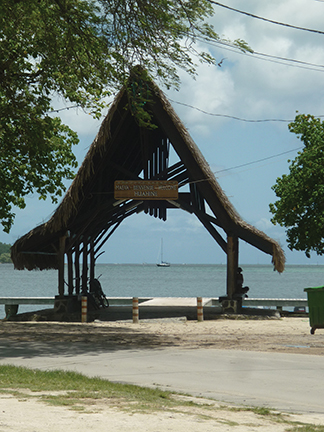 We are not being nonchalant, it is just hard to believe that this is all happening, again. Just over a year ago in Panama we were greeted by a terrified call on the local VHF morning net: “A tsunami is coming! A tsunami is coming!” It was information garnered from a friend of a friend of a mechanic ashore and sent instant shock waves through the busy anchorage. Within moments 50 boats hastily pulled up anchor and all headed out to sea in the same direction.
We are not being nonchalant, it is just hard to believe that this is all happening, again. Just over a year ago in Panama we were greeted by a terrified call on the local VHF morning net: “A tsunami is coming! A tsunami is coming!” It was information garnered from a friend of a friend of a mechanic ashore and sent instant shock waves through the busy anchorage. Within moments 50 boats hastily pulled up anchor and all headed out to sea in the same direction.
The night before, we had picked up the injectors for our engine that we’d had serviced but hadn’t had a chance to install them yet, so we had no engine. As Steve got to work I watched boat after boat motor by without anyone asking if we needed help, not even the people we knew hailed us to see if we were alright. The VHF was a constant stream of panicked scuttlebutt. There were even irrational reports from boats at sea that could “see the wave coming on the horizon.” It was every man for himself, just as long he could tell the rest of us what to do too.
A few boats were left at anchor, simply too disabled to move, the crew collecting a few belongings and heading ashore to find shelter. The last boat preparing to leave motored past, then doubled back to ask if we needed a tow. Standing on deck with the couple was their three young children; we’d never met them before. I was touched by their thoughtful offer, but we assured them that if we couldn’t motor out soon we’d just hoist the sails and escape the old fashioned way. We found it strange that the hundred or so merchant ships anchored out waiting to transit the canal failed to pull up anchor or respond in any way. And that there was no official warning given by the Port Authority and the shipping traffic into and out of the Panama Canal continued throughout the morning.
Finally, Steve got the engine running and we decided to take the better safe than sorry route and hauled up anchor and headed off in the opposite direction of the crowd. It turned out that there had been an earthquake in Chile, and the potential for a tsunami was genuine, but thankfully not realized.
THE REAL DEAL
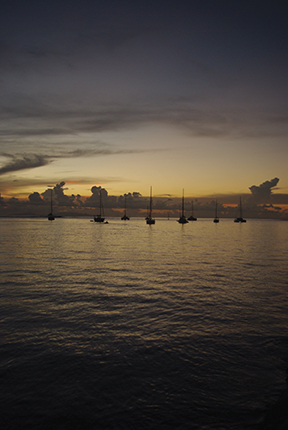 So on this morning across the Pacific we took the call to arms with a grain of salt. Unable to find a Wi-Fi signal we turned on the VHF, hoping Radio Tahiti would issue an announcement if there were indeed a tsunami headed our way. I put away the few stray dishes and books scattered about the cabin, glad that I didn’t have much to do to secure Kate for sea. Then there was nothing to do but wait; wait for more news, wait for twilight so we’d have enough light to navigate the reefs and the pass out of the harbor.
So on this morning across the Pacific we took the call to arms with a grain of salt. Unable to find a Wi-Fi signal we turned on the VHF, hoping Radio Tahiti would issue an announcement if there were indeed a tsunami headed our way. I put away the few stray dishes and books scattered about the cabin, glad that I didn’t have much to do to secure Kate for sea. Then there was nothing to do but wait; wait for more news, wait for twilight so we’d have enough light to navigate the reefs and the pass out of the harbor.
Around 5 a.m. the police began driving the streets with sirens, a loud speaker and lights flashing, telling the locals to seek higher ground. Radio Tahiti broadcasted warnings in French and English that any affects from the Japanese earthquake should reach the islands in less than two hours. They advised any vessels at sea to remain at sea and any vessels at anchor to head into deeper waters. All shipping traffic was suspended and all ports were officially closed. This was the real deal.
When it was just light enough to see, we picked up the anchor and slowly motored out of the harbor past a crowd of small local boats closer to the pass. It was no trouble finding deeper water as the ocean floor falls rapidly away, and shortly after we were cleared of the reef we were in 500 meters. A half a mile offshore, on a calm and glassy sea we pulled out some headsail and hove-to, joining the little fleet of sailboats that were anchored closer to town. There were no panicky calls or frenzied boat-to-boat gossip, all the vessels quietly milled around in the light breeze, obediently standing off. The only chatter on the VHF was Tahiti Radio repeating the advisory and communicating with ships in the surrounding waters. The mood was solemn as more reports about Japan were broadcasted on the local radio. I could only pick out words here and there in French, but the reports sounded grim.
CALM, BUT UNNERVING
A few hours later when we anxiously made our way back into the harbor I couldn’t help but notice that the reef seemed more exposed than usual. We’ve never approached this island without a swell running and breaking on the reef edge, so did it just look like the reef was awash today because it was calm? Had I really paid that close attention before? The rocks on shore were greasy with a light mist that started to fall so I couldn’t see a definite tide line. We hesitated briefly, but since a few other boats were heading in too, and seeing nothing else amiss, we decided to motor back to our favorite spot and throw the pick.
Everything seemed normal as we set the anchor and ducked below out of a passing rainsquall. I stuck my head out into the gusty wind that the rain brought and noticed that the reef across the harbor that was totally submerged when we came in a few moments ago was now dry. Taking a sweeping glance around the anchorage I could also see rocks that appeared as nasty brown smudges in the clear blue water were now breaking the surface and the channel marker close by was showing the coral growing beneath it’s low tide scum line. We decided to sit tight and wait. Five minutes later the water returned to its normal depth covering the rocks, the reef and the scum on the nearby buoys. There was no perceptible change in the currents or water flow and Kate remained stationary, pointing into the breeze. The rain stopped and the VHF was quiet, a few more boats anchored across the bay. Over the next half hour water levels silently dropped twice more before rising again. Suddenly, my fears of being boarded early this morning seemed trivial and I saw the day in a calm new light, full of opportunity.
Later that afternoon we headed over to Gitmor to check in and thank them again for thinking of us. I was surprised when they complained about not being given enough warning by the local authorities, of not having enough time to prepare. All I could do was to keep my mouth shut, paste a smile on my face and hope that perhaps someday they will learn to appreciate what they do have and how lucky they are.
The initial damage reports out of Japan were shocking, but it would be several weeks before the world finally realized the terror and the horrible devastation that the Japanese people faced. Even now, years later, rubble is washing up on distant shores, reminding us of the awesome power of the ocean. We have weathered two more tsunami warnings since then, one in Tonga and the other in Fiji. Thankfully, neither resulted in as much as a wavelet but they sent a shockwave through me, taking me back to that morning in Huahine as I watched the dying breaths of such a destructive force half a world away.
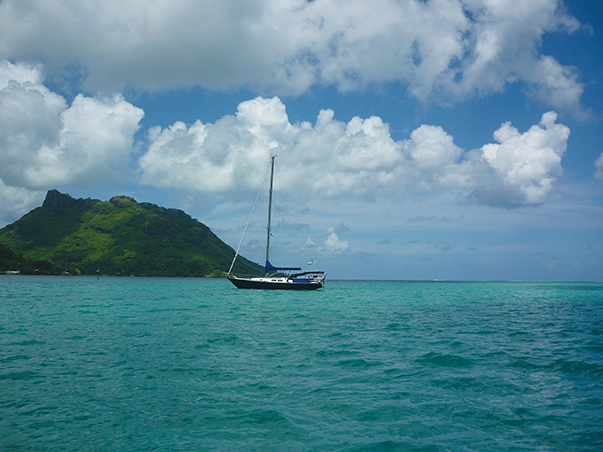
Heather Francis is originally from Nova Scotia, Canada and has been sailing with her partner, Steven Hertik, on board their Newport 41 Kate since 2008. They have spent the last three years in the South Pacific. To follow their adventures log onto www.yachtkate.com.
